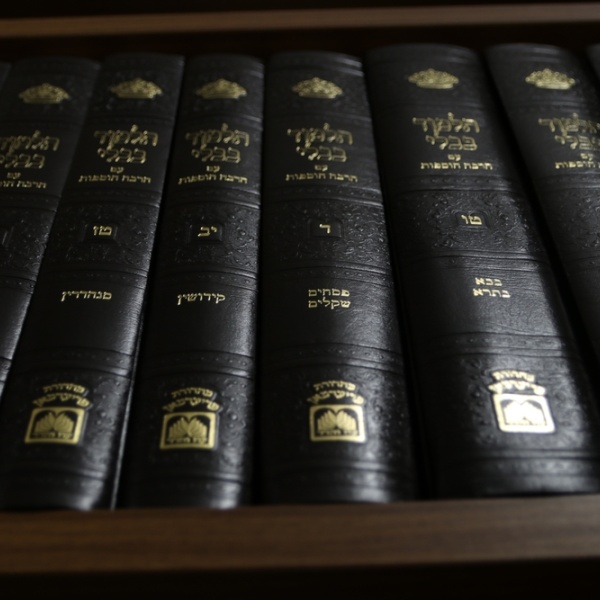
Our Sages were greatly concerned lest one waste money, and even forbade one from spending excessive amounts in the performance of mitzvoth (Ketubot 50a). "All that our Sages establish, they establish parallel to Torah law" (Pesachim 30a). In five cases the Torah obligates the bringing of a sin offering--with the sacrificial object dependent on the wealth of a person bringing the sacrifice. Those of means were to bring an animal; the middle class, fowl; and (in certain cases) the poor were to bring a flour offering. The Sefer Hachinuch (#123) notes that were a poor person to bring an animal, he would not fulfill his obligation. If the Torah says spend less, then it is improper to spend more--"the Torah has mercy on the money of the Jews"(Rosh Hashanah 27a).
Two cases in the opening pages of Ketubot demonstrate how deeply monetary issues can influence the halacha. "It has been taught: If his bread was baked and his meat prepared and his wine mixed and the father of the bridegroom or the mother of the bride died, they bring the dead [person] into a room and the bridegroom and the bride into the bridal chamber and he performs the dutiful marital act and [then] separates [himself from her]. And [then] he keeps the seven days of the [wedding] feast and after that he keeps the seven days of mourning" (Ketubot 3b-4a).
What a tragic situation! After months of preparation and anticipation, a couple is about to begin building their home together. Literally hours before the wedding, the father of the chatan or the mother of the kallahdies. Those who would have the status of king and queen are suddenly transformed into onanim[1]. What should happen is the burial of the dead, shiva, and the postponement of the wedding until the end of the mourning period.
However, to do so is to place an enormous financial burden on the family, requiring one to effectively pay for two weddings. As Rashi notes the practice in Talmudic times was that the costs of the wedding meal were paid by the father of the groom, with the mother of the bride paying for the trousseau[2]. If the wedding were to be postponed until after the shiva, the food and other disposables would need to be thrown out and repurchased for the actual wedding. Furthermore, with the death of those who actually plan and pay for the wedding, arrangements for a new wedding date may be a long time coming.
Undoubtedly, this is emotionally most difficult--how does one dance when "the dead lay before them"? However, the alternatives are even worse. Dancing a week later is not likely to be much easier, and postponing the wedding indefinitely is a non-starter. If the food could be salvaged by selling it and the wedding could take place right after shiva, we would do so; but faced with a potential indefinite delay, Judaism affirmed that a wedding which celebrates life must take precedence over a funeral which mourns death. And as difficult as it may be, the Torah demands that man control his emotions. Only by doing so can one properly fulfill the mitzvah of simcha on Yom Tov, loving our neighbour, and refraining from jealousy[3].
The cost of making a wedding serves as the basis of the opening Mishnah of the Masechet, dealing with the case where the husband claims his wife was not a virgin. In explaining why we might believe this claim, the Gemara says that we have a chazaka, a presumption, that "a person does not exert himself for [a wedding] meal for naught" (Ketubot 10a). People do not like to throw out money, and it makes little sense to pay for a wedding if one plans to end the marriage the morning after. One can reasonably assume that the husband is only making such a claim because it is true.
This is true even, perhaps especially, with people of great wealth. The modern day pre-nup calls for a penalty of $150 a day if a spouse refuses to appear before a beit din. While one may have thought that such an amount may not deter the very wealthy, such has not been the case. Whether because one does not want to waste money, or because one can't stand the notion of paying someone from whom they have separated, making someone pay money is sure to change behavior.
[1] An onein is one whose immediate relative has died but has not yet been buried. Such a person is generally forbidden to observe positive mitzvoth.
[2] Perhaps the reason the mother of the groom was not involved in the planning of the wedding is due to the Talmudic assertion that while a mother may love her son-in-law, she has no such emotion for a daughter-in-law.
[3] This is perhaps the most difficult mitzvah of the Torah. As the Ibn Ezra notes (Shemot 20:13), just as a peasant would not entertain thoughts of marrying a princess, one must see the possessions of others as so beyond our reach that we would not dream of having them.
